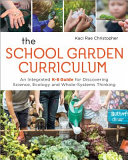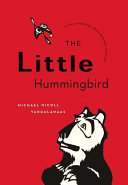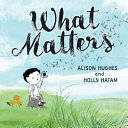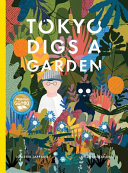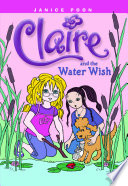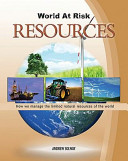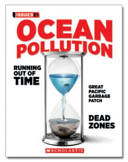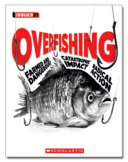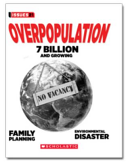Listed below are selected teacher resources, picture books, fiction, and non-fiction related to environmental science and sustainability.
Teacher Resources
by Kaci Rae Christopher
Grades: K-8
The author offers a comprehensive framework enabling students to grow their knowledge throughout the school year and build on it from kindergarten to grade eight. From seasonal garden activities to inquiry projects and science-skill building, children will develop organic gardening solutions, a positive land ethic, systems thinking, and instincts for ecological stewardship.
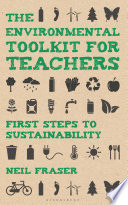 The environmental toolkit for sustainability: First steps to sustainability
The environmental toolkit for sustainability: First steps to sustainability
written by Neil Fraser, illustrated by Hanna Forsgren
Grades: K-12
This guide shows ways to reduce your school’s ecological footprint, and create and embed a sustainability ethos. Whether you are a teacher eager to make your classroom a more eco-friendly environment or a head teacher who wants to set up a whole school project, there are practical strategies and activities in this book for you. This book includes 75 eco-projects and lessons that cover how to manage litter, waste and energy efficiently in a time saving, cost effective manner, as well as how to get students involved in the projects.
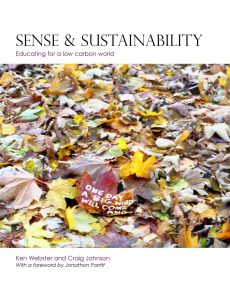 Sense & sustainability: Educating for a low-carbon world
Sense & sustainability: Educating for a low-carbon world
by Ken Webster et al.
Grades: K-12
This book makes the case for a practical education for sustainability based on exploring and testing frameworks. The authors suggest that education contributes most to the future of our young people when it opens up discussion on how sustainable can be aspirational, talking about “better and better” rather than “less and less”. Comes with online materials and resources for continuing professional development.
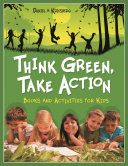 Think green, take action: Books and activities for kids
Think green, take action: Books and activities for kids
written by Daniel A. Kriesberg, illustrated by Kathleen A. Price
Grades: 3-7
This book combines a wide variety of techniques to help students understand environmental issues and gain the skills needed to take action. The children’s literature and classroom activities suggested here cover three major environmental issues: endangered species, resource depletion, and pollution. After students have a grasp of the causes of these environmental problems, the final chapter presents ways to take easy action that can create ripples of change across the world.
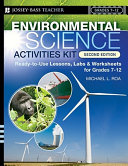 Environmental science activities kit: Ready-to-use lessons, labs and worksheets for grades 7-12
Environmental science activities kit: Ready-to-use lessons, labs and worksheets for grades 7-12
by Michael L. Roa
Grades: 7-12
This book includes more than 35 lessons for middle and high school science teachers on the most compelling and relevant environmental topics, such as global warming, food and water production, alternative energy sources, endangered species, land-use issues, and many more.
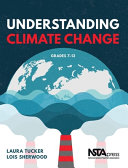 Understanding climate change: Grades 7-12
Understanding climate change: Grades 7-12
by Laura Tucker and Lois Sherwood
Grades: 7-12
A nine-session module which includes engaging lessons and activities to help students understand climate change. Includes sections on addressing misconceptions surrounding climate change, evaluating information, understanding the science, and creating solutions.
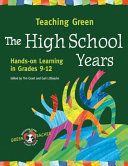 Teaching green, the high school years: Hands-on learning in grades 9-12
Teaching green, the high school years: Hands-on learning in grades 9-12
edited by Tim Grant and Gail Littlejohn
Grades: 9-12
This book offers fifty teaching strategies that promote learning about natural systems and foster critical thinking about environmental issues, both local and global. Readers learn how best to apply systems thinking, teach about controversial issues, and use a step-by-step approach to creative problem-solving in environmental projects. Also provided are instructions for measuring the ecological footprint of a high school, creating an indoor “living system” that cleans water, monitoring air quality with lichens, and using green technologies to help green school campuses.
Picture Books
written by Ted Kooser, illustrated by Barry Root
Grades: K-3
When a plastic bag is uprooted from a landfill, it begins a journey on the wind that leads to its being used and re-used by many people.
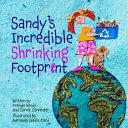 Sandy’s incredible shrinking footprint
Sandy’s incredible shrinking footprint
written by Femida Handy and Carole Carpenter, illustrated by Adrianna Steele-Card
Grades: K-3
Sandy and her dog Pepper are upset when they find garbage on the beach they love. With the help of the Garbage Lady, they start to learn about everyone’s ecological footprint.
by Michael Nicholl Yahgulanaas
Grades: K-3
When the forest is on fire and all of the other animals are frozen with fear, a tiny hummingbird finds the courage to try to save their home.
written by Allison Hughes, illustrated by Holly Hatam
Grades: K-2
When one small boy picks up one small piece of litter, that one small act has big ripples through nature’s connections.
written by Jon-Erik Lappano, illustrated by Kellen Hatanaka
Grades: K-2
Tokyo’s small house is increasingly surrounded by skyscrapers and highways. But when an old woman gives him seeds to plant, Tokyo discovers that the big city can become wild again.
Fiction
by Janice Poon
Grades: 2-5
Claire and her friends Jet and Sky team up to try to find the polluters who’ve been making the water in a local lake undrinkable.
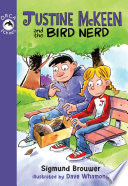 Justine McKeen and the bird nerd
Justine McKeen and the bird nerd
written by Sigmund Brouwer, illustrated by Dave Whamond
Grades: 2-5
When a small bird is injured after flying into a school window, the students are shocked and upset. But they are even more shocked when school bully Jimmy Blatzo rescues the bird and nurses it back to health. When the students discover that the problem isn’t just at their school, young green activist Justine McKeen convinces Jimmy to talk to town council about the issue.
Non-Fiction
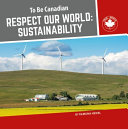 Respect our world: Sustainability
Respect our world: Sustainability
by Ramona Heikel
Grades: 3-6
Discusses efforts by Canadians to preserve water quality, conserve wildlife, clean up pollution and use sustainable energy sources. Part of the To Be Canadian series.
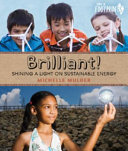 Brilliant! Shining a light on sustainable energy
Brilliant! Shining a light on sustainable energy
by Michelle Mulder
Grades: 3-7
Did you know that cars can run on french fry grease, or that kids in Mexico help light up their houses by playing soccer? This book is full of examples of unusual (and often peculiar) power sources, and encourages kids to look around for sustainable ways to light up the world. Part of the Orca footprints series.
by Andrew Solway
Grades: 4-7
Discusses how we manage the limited natural resources of the world. Part of the World At Risk series
by Douglas Fraser
Grades: 6-9
Part of the Issues 21 series, which examines contemporary issues in society in order to develop students’ skills in the areas of critical thinking, creativity, communication, collaboration, ethical citizenship and activism. Includes 6 student books and a teacher’s guide.
by Erika Boas
Grades: 6-9
Part of the Issues 21 series, which examines contemporary issues in society in order to develop students’ skills in the areas of critical thinking, creativity, communication, collaboration, ethical citizenship and activism. Includes 6 student books and a teacher’s guide.
by Jeffrey D. Wilhelm
Grades: 6-9
Part of the Issues 21 series, which examines contemporary issues in society in order to develop students’ skills in the areas of critical thinking, creativity, communication, collaboration, ethical citizenship and activism. Includes 6 student books and a teacher’s guide.
by Brian Arleth
Grades: 6-9
Part of the Issues 21 series, which examines contemporary issues in society in order to develop students’ skills in the areas of critical thinking, creativity, communication, collaboration, ethical citizenship and activism. Includes 6 student books and a teacher’s guide.
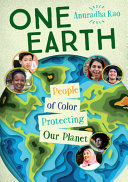 One earth: People of color protecting our planet
One earth: People of color protecting our planet
by Anuradha Rao
Grades: 7-10
This nonfiction book profiles twenty environmental activists of colour from around the world. Their individual stories show that the intersection of environment and ethnicity is an asset, not an obstacle, to helping the planet. Illustrated with photos of each of the people profiled.
 Groundswell: Indigenous knowledge and a call to action for climate change
Groundswell: Indigenous knowledge and a call to action for climate change
edited by Joe Neidhardt and Nicole Neidhardt
Grades: 10-12
This collection of essays from both Indigenous and non-Indigenous writers presents a compelling message about how traditional Indigenous knowledge and practices can – and must – be used to address climate change.
Further Reading
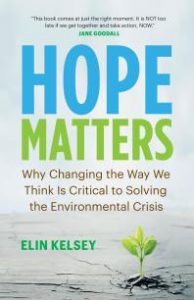 Hope Matters: Why Changing the Way We Think Is Critical to Solving the Environmental Crisis
Hope Matters: Why Changing the Way We Think Is Critical to Solving the Environmental Crisis
by Elin Kelsey
Explores “evidence-based hope” in relation to climate change. Provides a framework for how to address eco-anxiety, setting a foundation for how we might approach climate change education in the classroom.
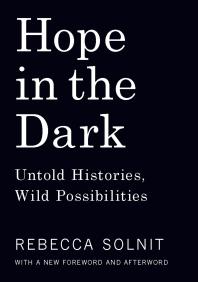 Hope in the Dark: Untold Histories, Wild Possibilities
Hope in the Dark: Untold Histories, Wild Possibilities
by Rebecca Solnit
Solnit also makes a case for hope and committing to action. She focuses on recognizing the victories, small and large, that have been achieved and bringing attention to the far-reaching impact those victories have and still could provide.
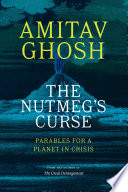 The Nutmeg’s Curse: Parables for a Planet in Crisis
The Nutmeg’s Curse: Parables for a Planet in Crisis
by Amitav Ghosh
Discusses the intersection of colonialism and climate change. Diving into the history of the familiar nutmeg spice, Ghosh reveals how trade and conquest set the stage for our current predicament.
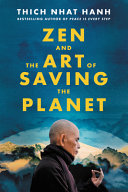 Zen and the Art of Saving the Planet
Zen and the Art of Saving the Planet
by Thich Nhat Hanh
Explores the ways in which meditation and mindfulness can lead to climate action. Discusses how we can shape our mind, and therefore influence our actions, reactions and well-being in every day life.
Finding More Resources
To find more resources in this area, try the following:
- Search using the General tab on the UBC Library website to look for material in all UBC Library branches.
- Search using “Search Education Resources” box in the left hand bar on the Education Library website to limit your results to materials in the Education Library.
- Use specific search terms to narrow your results, such as “environmentalism”, “environmental science”, “environmental studies”, “environmental education”, “sustainability”, or “conservation of natural resources”.
- To find lesson plans, include “lesson plans”, “lesson planning”, or “activity programs” in your search terms.
For more help with searching, please visit the Library Service Desk or e-mail ed.lib@ubc.ca.

